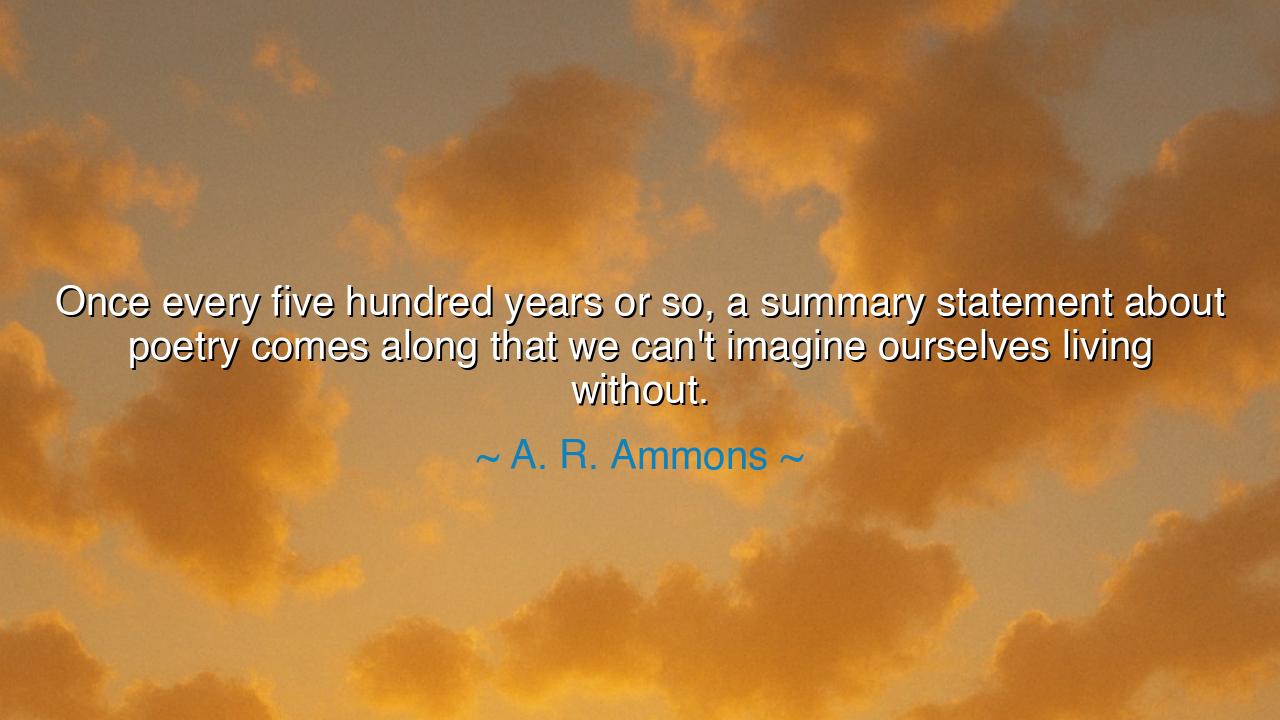
Once every five hundred years or so, a summary statement about
Once every five hundred years or so, a summary statement about poetry comes along that we can't imagine ourselves living without.






Hear the words of A. R. Ammons, poet of earth and sky, who declared: “Once every five hundred years or so, a summary statement about poetry comes along that we can't imagine ourselves living without.” In this saying is the recognition that poetry, though ever-flowing, sometimes condenses into a single vision, a single declaration that becomes a torch for generations. Not every age produces such a saying; centuries may pass in silence. But when it comes, it is like thunder over the mountains, a truth so vast and radiant that all who follow must walk by its light.
The meaning of this quote is twofold. First, Ammons points to the rarity of such revelations—most commentary on poetry is like waves that rise and fall, soon forgotten. But every few centuries, a figure emerges who crystallizes the very essence of the art. Their words are not just observations but revelations, shaping how poetry is read, written, and remembered. Second, he reminds us of the endurance of such sayings. They live not only in the minds of poets, but in the spirit of cultures, becoming part of the very foundation upon which future poets stand.
Consider the ancients. Aristotle, in his Poetics, offered one of these rare summary statements. He spoke of tragedy as the imitation of action that brings catharsis, a purging of pity and fear. His vision was not merely commentary—it was a definition that guided Western art for millennia. Even now, his words remain a compass. Without them, our understanding of drama and poetry would be poorer, less whole. Here Ammons’s prophecy is fulfilled: such statements come rarely, but when they do, we cannot live without them.
History gives us another witness in the words of Horace, who declared in his Ars Poetica that the task of poetry is to delight and instruct. This simple truth became a guiding principle of Roman letters and later of the Renaissance. Whole schools of poets and critics drew their strength from this vision. One line, one declaration, shaped centuries of creation. Horace’s words proved Ammons’s point: every so often, a statement about poetry descends like a law from heaven, and all who follow cannot help but reckon with it.
So too, in later ages, Wordsworth declared that poetry is the spontaneous overflow of powerful feelings, recollected in tranquility. With this vision, he reshaped Romanticism, turning poetry from the formal ornaments of neoclassicism into the heartbeat of personal experience. His words continue to echo in the minds of poets and readers alike. Would we know Romantic poetry without them? Perhaps not. Here again, a rare and immortal statement came forth, and humanity could not live without it.
The lesson for us is this: in every age, there are countless words about poetry, but only a few that endure. Treasure them, learn them, and live by them, for they are not merely definitions but revelations of the human spirit. When such a statement arises in your own lifetime, recognize it—cling to it, and let it guide you. Do not treat it lightly, for it is a voice that speaks not only for the present but for the centuries.
Practical is this path: read deeply, not only poems but the reflections of those who shaped poetry itself. Seek Aristotle, Horace, Wordsworth, and others whose words endure. Ask yourself which sayings have the power to guide not only your writing but your living. For Ammons reminds us that such words come rarely, like comets across the night sky. And when they do, they light the way not for one poet, nor for one age, but for the whole pilgrimage of mankind. Poetry, after all, is not only written line by line—it is carried through centuries, shaped by those rare voices whose truths we cannot imagine living without.






KMKh minh
This quote really makes me think about how much poetry shapes our perception of the world. If every 500 years, a statement about poetry comes along that feels essential, does that mean that the nature of poetry itself is constantly evolving? Or is it that certain insights are just so perfectly timed that they become part of how we understand poetry at that moment in history?
TTThanh tuan
I can’t help but wonder if Ammons is talking about those rare moments when a perspective or an idea about poetry feels so true that we can't imagine not having it. Do you think these moments happen because of a collective need for understanding, or do they happen randomly, as if by chance? What is it about poetry that allows it to hold such profound meaning for so many, yet so infrequently have these breakthroughs?
Dduyquypham
This makes me reflect on the nature of great poetic insight. Why is it that certain ideas about poetry resonate so deeply with us, even when they seem so rare? It’s as though every few generations, a voice captures the essence of poetry in a way that feels universal. What do you think makes a statement about poetry so timeless and unforgettable? Is it about capturing a truth, or is it something about the way it’s expressed?
MNChi Manh Nguyen
I think this quote speaks to the profound impact that certain insights about poetry can have. It’s as if the right words at the right time can change the way we view poetry and its place in our lives. Have you ever read a poem or heard a statement about poetry that made you see it in a completely new light? What makes a statement about poetry so powerful that it becomes indispensable to us?